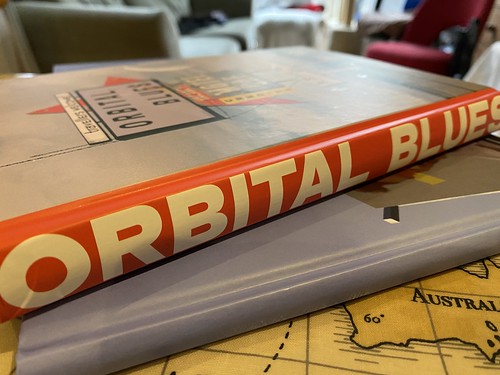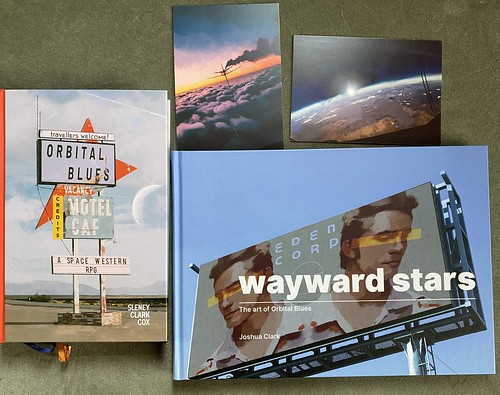 |
| Orbital Blues has some of the most distinctive art & layout I've seen. |
TL;DR: Orbital Blues is a simple, rules light RPG that riffs on the Traveller engine and aims for the a space western vibe, set in a lived-in universe of faded and failing hyper-capitalism. Characters are flawed, broke and trying to make a living in a hard universe. Their troubles will likely consume them, as debt and pressure builds. The book looks gorgeous and is really atmospheric; you can clearly see what they're trying to achieve. I love SF roleplaying games, and loved much of the material described as inspiration. There is much to love here, but there is something missing. The nihilism of the tone undermines my urge to run a game with this. The game misses the aspects of hope that its inspirations had; the Firefly crew were always optimistic that they'd make that score, the Guardians upbeat but cynical. This is a game that has mechanics for the impact of character's troubles but no counter-point to give a high note. Played as presented, the darkness of the setting and the mechanics eats at the soul. Usually, I'd be bursting with ideas to run a game having read something this well put together, but I'm not feeling the love. And that's a huge shame to me as this has been so lovingly put together.
Orbital Blues describes itself as the rock-and-roll future that never was and that nobody wanted. It's a game of bounty hunters, vagrants and bleeding heart outlaws. Players form the crew of a ship trying to make a living, with the odds stacked against them. The blurb references Cowboy Bebop, Firefly and Guardians of the Galaxy as the space western inspiration that underpins the game. I guess you could probably add shades of The Mandalorian and The Book of Boba Fett to that these days. They're all good references, but the feel of the game is slightly more melancholic than the sources mentioned. Firefly and Guardians both have a hopeful vibe within them that I didn't find in Orbital Blues.
The book is hardcover, with 208-pages in full colour. The endpapers are bright orange and contain random tables for creation of places for the characters to visit. The artwork by Joshua Clark is superb and deserving of the accompanying book, Wayward Stars, which takes you through the development of the pieces used in the book. It is one of the best illustrated and laid out books that I have seen.
There are a couple of typos, but nothing jarring and nowhere near the issues I found in Best Left Buried: Deeper which killed that product for me. This was a relief as the early release looked like it was going the same way. Some of the later section feels a bit rushed, but I suspect that isn't the case. Rather, they took a decision to tell you how to generate the NPCs rather than do it for you.
Mechanically, you have three core stats, Muscle, Grit and Savvy, which range from 0 to +2. They can drop below zero in some circumstances and characters are described as being above average. Stats get added or subtracted from dice rolls.
As you develop you crew, each player picks a title for their character that reflects the concept; the Muse, the Hick, the Stray, the Wheels, the Drinker and more are given across a two-page spread for inspiration.
Characters have two ratings that reflect how damaged they become; Heart, which functions as a physical damage track, and Blues. Blues come from your Troubles, which are past misdeeds, regrets and vices that haunt you and function as hooks in play. Your character also starts with a Gambit; something that they can call upon to get a job done, often providing a mechanical advantage for dice rolls. They can gain more Troubles and Gambits as you play.
Characters also start with equipment and mementos. Equipment works with tags for effect and mementos provide roleplaying opportunities to draw upon. Starships are have three stats, just like characters (in this case called Body, Mobility and Systems) and there are random tables to aid in creating and naming them. It's also suggested that you pick a piece of music to represent your character.
The core game mechanic is very similar to Traveller. Roll 2d6 and add the appropriate stat and try and get more than eight. The Mongoose Traveller 2nd edition boon/bane advantage/disadvantage mechanic is implemented and ties closely to gambits and other situational modifiers. If you have the upper hand (advantage) you roll 3d6 and chose the highest two dice. If you are against the odds (disadvantage) you roll 3d6 and take the lowest two dice as your result. Heart can be spent as Exertion to re-roll any number of dice.
You may need to make a Blues check if your trouble requires or if something terrible happens. This is a stat check with grit; success gives you a point of Blues. If you end up with 8 Blues, you can declare that Trouble is Brewing, and you trigger a scene where you confront your trouble. It makes you harder to hurt, and you can spend Blues for exertion; at the end of the scene, your Blues resets to zero and you can gain new Troubles and Gambits, or raise your stats.
Combat is reasonably abstract. Initiative order is taken from a d3 roll with Savvy added, with highest results going first. Melee weapons provide an advantage for initiative, but range may tell on this.
Attack rolls are handled differently to Stat Checks. You roll three dice, not two. You can take any two dice as the roll to attack, but still need to get 8 or more. The remaining dice forms the base damage. Upper hand adds an extra dice as usual (you keep the best three) and vice versa when you are against the odds. Again, this harks back to Best Left Buried. Hitting zero heart kills NPCs and antagonists; players will need to make a single die roll, shooting to roll above their number of Troubles to avoid death.
Personal scale weapons won't usually damage vehicles, but may well hurt occupants.
If it's all too much for your character, you can declare a scene as your Swansong. This gives you significant mechanical advantages but your character will suffer a mortal wound and die at the end of the scene.
Starship combat has its own section and there are different roles for crew members to take (Helm, Sensors, Communications, Repair, Weapons and more) with a selection of actions for each. There are also guidelines for dealing with disturbances - phenomena which may impede, damage or amplify aspects of a ship's performance. Some tables of examples are given.
Money is handled somewhat abstractly with credits and debts. The system is loaded to pressure your characters with debt (because it drives the need to adventure and take risks). It reminds me of aspects of Best Left Buried. Higher debt can cause problems, and bad things can happen. If you turn a profit, you can save or invest in improving or repairing your ship.
There's a decent expanded equipment section. In addition, there's a section that provides statistics and example vehicles and starships.
The GM section includes some good guidance on running the game, helpful notes on running chases, and then some decent advice on creating scenarios which includes a set of typical missions and related random tables for legal and illegal work. There's discussion of handling the repercussions of adventures and guidance on creating new Troubles and Gambits.
There's a section on creating goons, packed with examples; these come at three levels - individuals, mobs and organisations. Stats and resources change the larger the group faced. There are examples from the police, mobsters, pirates, corporates and local muscle. Marks are the bosses and significant individuals; they will have gambits and perhaps even troubles. There are examples from a wide range of backgrounds.
The book then moves onto an example location for adventures, the Sutler System. There are key contacts, locations, rumours and hooks. The Bounty Board can provide missions and there's a random events table for travel. Locations are detail along with key establishments that the characters may end up at along with the characters and hooks they can encounter there. It works as a decent sandbox and there's guidance on how to tailor the key NPCs to give the flavour that you want.
The book wraps up with some sound advice on taking care, especially around Troubles as they can lean into areas around mental health that some players may not be comfortable with.
The package from the kickstarter came with some nice postcards of the art and an accompanying book, Wayward Stars, which explains how key parts of the art were created. I enjoyed this, as it gave some genuine insight into the vibe the authors were aiming for and the way the look was created.
To conclude: Orbital Blues is a simple, rules light RPG that riffs on the Traveller engine and aims for the a space western vibe, set in a lived-in universe of faded and failing hyper-capitalism. Characters are flawed, broke and trying to make a living in a hard universe. Their troubles will likely consume them, as debt and pressure builds. The book looks gorgeous and is really atmospheric; you can clearly see what they're trying to achieve. I love SF roleplaying games, and loved much of the material described as inspiration. There is much to love here, but there is something missing. The nihilism of the tone undermines my urge to run a game with this. The game misses the aspects of hope that its inspirations had; the Firefly crew were always optimistic that they'd make that score, the Guardians upbeat but cynical. This is a game that has mechanics for the impact of character's troubles but no counter-point to give a high note. Played as presented, the darkness of the setting and the mechanics eats at the soul. Usually, I'd be bursting with ideas to run a game having read something this well put together, but I'm not feeling the love. And that's a huge shame to me as this has been so lovingly put together.
 |
| Oribital Blues and its companion material. |
5 February 2022
No comments:
Post a Comment